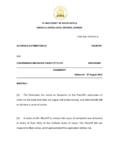Transcription of THE SUPREME COURT OF APPEAL OF SOUTH …
1 `. THE SUPREME COURT OF APPEAL OF SOUTH africa . JUDGMENT. Not Reportable Case No: 31/2016. In the matter between: MOSHINA ESSOP. APPELLANT. and THE STATE. RESPONDENT. Neutral citation: Essop v S (31/2016) [2016] ZASCA 114 (12 September 2016). Coram: Bosielo, Zondi and Van der Merwe JJA and Schoeman and Potterill AJJA. Heard: 18 August 2016. Delivered: 12 September 2016. Summary: Criminal Procedure: APPEAL against refusal by COURT below to grant leave to APPEAL on petition: test is whether the appellant has reasonable prospects of success on APPEAL : leave to APPEAL against refusal of petition is granted. 2. _____. ORDER. _____. On APPEAL from: KwaZulu-Natal Division, Pietermaritzburg (Ntshangase and Seegobin JJ sitting as COURT of APPEAL ): 1 The APPEAL succeeds. 2 The order refusing the appellant leave to APPEAL is set aside and is replaced with the following order: The appellant is granted leave to APPEAL against sentence imposed by the regional COURT , Pietermaritzburg to the KwaZulu-Natal Division, Pietermaritz- burg.
2 '. _____. JUDGMENT. Zondi JA (Bosielo and Van der Merwe JJA and Schoeman and Potterill AJJA. concurring): [1] This is an APPEAL against the refusal by the KwaZulu-Natal Division, Pietermaritzburg (Ntshangase and Seegobin JJ) of the appellant's petition for leave to APPEAL against the sentence imposed by the regional COURT . [2] The appellant appeared in the regional COURT , Pietermaritzburg facing 17 counts of theft of attorneys' trust funds totalling R406 under the control of her employers, Stowell and Company. She pleaded guilty to all the counts and was duly convicted. After all counts were taken together for the purposes of sentence, she was sentenced to 10 years' imprisonment, five years of which were suspended for a period of five years on condition that she was not convicted of theft or any competent verdict of theft 3. committed during the period of suspension. After her application for leave to APPEAL against sentence was refused by the trial COURT the appellant petitioned the Judge President (KwaZulu-Natal Division, Pietermaritzburg) for leave to APPEAL against sentence.
3 Her petition was dismissed. [3] The appellant thereafter applied to the COURT below for leave to APPEAL to this COURT against dismissal of her petition for leave to APPEAL by the COURT below. Ntshangase and Seegobin JJ initially heard the application for leave to APPEAL , but they could not agree on whether or not to grant leave. In consequence, the application was postponed and a full COURT was constituted to hear it. Ntshangase, Pillay and Seegobin JJ, now sitting as the full COURT heard the application and granted leave to APPEAL to this COURT against the refusal of the petition. [4] As this application for leave was brought prior to the coming into operation of the Superior Courts Act 10 of 2013, the procedure as set out in S v Kriel [2011] ZASCA. 113; 2012 (1) SACR 1 (SCA) must therefore be followed. In Kriel, this COURT held at para 12: Like the COURT in Matshona we, too, cannot determine the merits of the APPEAL . The issue before us is whether leave to APPEAL to the High COURT should have been granted and not the APPEAL itself.
4 '. [5] The issue before this COURT is whether the petition for leave to APPEAL against the sentence imposed by the trial COURT should have been granted by the KwaZulu-Natal Division. In other words, at this stage what we need to decide is whether leave should have been granted by the two judges before whom the petition served and not the APPEAL In Matshona this COURT held that the test to be applied is whether there is a reasonable prospect of success in the intended APPEAL and not whether the APPEAL itself 1. S v Khoasasa [2002] ZASCA 113; 2003 (1) SACR 123 (SCA) paras 14 and 19-20; S v Matshona [2008] ZASCA 58;. [2008] 4 All SA 68 (SCA) para 4; S v Smith [2011] ZASCA 15; 2012 (1) SACR 567 (SCA) para 3. 4. ought to succeed or not. [6] What the test entails was explained in these terms by this COURT in Smith at para 7: What the test of reasonable prospects of success postulates is a dispassionate decision, based on the facts and the law, that a COURT of APPEAL could reasonably arrive at a conclusion different to that of the trial COURT .
5 In order to succeed, therefore, the appellant must convince this COURT on proper grounds that he has prospects of success on APPEAL and that those prospects are not remote, but have a realistic chance of succeeding. More is required to be established than that there is a mere possibility of success, that the case is arguable on APPEAL or that the case cannot be categorised as hopeless. There must, in other words, be a sound, rational basis for the conclusion that there are prospects of success on APPEAL .'. [7] In an attempt to demonstrate that there are reasonable prospects of success on APPEAL , counsel for the appellant referred to various findings made by the trial COURT which he submitted were clearly wrong and constituted a misdirection on its part. He submitted that contrary to the trial COURT 's findings, there was no evidence: first, that the appellant resigned because it had become too dangerous to continue working for the complainant; secondly, that the appellant was a danger to society or its property and that it needs to be protected; and thirdly, that the appellant's three minor children would not be left destitute should a custodial sentence be imposed on the appellant as her husband and his family are available to care for them.
6 He pointed out that the evidence was that the appellant's family, due to their own personal circumstances, were not willing to care for the children and that their father, who had not been involved in their upbringing since divorce, was reluctant to care for them. In this regard, he submitted that the magistrate's finding demonstrated that she failed to consider the rights of the children as she was enjoined to do so by s 28(2) of the He submitted further that the magistrate erred by failing to properly recognise that the appellant was the primary caregiver, the impact her incarceration will have on the children and, if they would be 2. Section 28(2) of the Constitution of the Republic of SOUTH africa provides as follows: A child's best interests are of paramount importance in every matter concerning the child.'. 5. adequately cared for whilst the appellant is in prison. [8] It is instructive to note that as regards an enquiry under s 28 of the Constitution, the magistrate's finding was that the children would be adequately cared for while the appellant is incarcerated because Welfare is there and they will [intervene] and foster care can be organised if there is a problem'.
7 The interests of the minor children must be considered independently, not subsumed into a consideration of the appellant's circumstances. The appellant's contention that the interests of the minor children were not properly considered, might be correct. [9] Furthermore, it was submitted that the magistrate failed to give due consideration to a sentence in terms of s 276(1)(h) or (i) of the Criminal Procedure Act 51 of 1977 and sufficient weight to the pre-sentence reports recommending that the appellant was a suitable candidate for correctional supervision and that such sentence would be an appropriate sentence in the circumstances. [10] In my view, having regard to the issue that is before us for consideration, there is merit in the appellant's submissions that the magistrate misdirected herself in determining or applying the facts for assessing the appropriate sentence to be imposed on the appellant. It follows that I am persuaded that there are reasonable prospects that the APPEAL might succeed.
8 Leave to APPEAL should have been granted. [11] In the result the following order is made: 1 The APPEAL succeeds. 2 The order refusing the appellant leave to APPEAL is set aside and is replaced with the following order: The appellant is granted leave to APPEAL against sentence imposed by the regional COURT , Pietermaritzburg to the KwaZulu-Natal Division, Pietermaritz- 6. burg.'. _____. D H Zondi Judge of APPEAL 7. Appearances For the Appellant: B S Osborne Instructed by: Carlos Miranda Attorneys, Pietermaritzburg Matsepes Inc, Bloemfontein For the Respondent: Z G Mshololo Instructed by: The Director of Public Prosecutions, Pietermaritzburg The Director of Public Prosecutions, Bloemfontei














